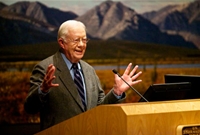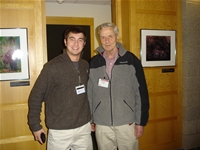Three LC environmental studies majors received scholarships to attend the Arctic National Wildlife Refuge 50th Anniversary Symposium held in January at the U.S. Fish and Wildlife Service National Conservation Training Center in Shepherdstown, W.Va.

The three-day symposium, attended by about 150 people, featured conservation historians and conservation leaders. Keynotes were given by former President Jimmy Carter, who expanded the 9-million-acre refuge in northeastern Alaska to 19.6 million acres in 1980 as part of the landmark Alaska National Interest Lands Conservation Act, and Dr. George Schaller, globetrotting field biologist whose research on mountain gorillas, giant pandas, and large cats has taken him from the Tibetan Plateau to the depths of the Amazonian rainforest. In his two months in the Arctic wilderness, Schaller recorded 86 species of birds and 23 species of spiders.
“When I received the email relating to the Arctic National Wildlife Refuge 50th Anniversary Symposium, I immediately knew I had to go,” said Deane Flickinger, LC senior from Mechanicsville, Va. (pictured below with Dr. Schaller). “The fact that there were scholarships given to only a handful of students by the U.S. Fish and Wildlife Service National Conservation Training Center made the opportunity even greater.
“For four days we were able to interact with some of the world’s top players in conservation, politics, and history. I took away a much better understanding of the Arctic refuge and how important a place it truly is to our Earth.”
Paul Cole, a junior from Vienna, Va., agreed: “I basically learned that the Arctic National Wildlife Refuge is not covered in rock and snow and is instead full of life in untouched ecosystems which represent the very essence of our being. Setting aside the refuge is not only the responsible thing to do but it is our obligation as humans.”
Patrick Ferrer, a junior from Charlotte, N.C., said, “I think opportunities like this are once in a lifetime. The who’s who of conservation were there … and the chance to get to listen to them speak to me in such a personal setting made the message that much more potent.”
Other speakers included Thomas Strickland, assistant secretary of the interior for fish and wildlife and parks; noted Rice University historian Dr. Douglas Brinkley (whose latest book, The Quiet World/Saving Alaska’s Wilderness Kingdom, 1879-1960, debuted at the NCTC conference); and Lynn Greenwalt, former director of the Fish and Wildlife Service, under whose tenure the 1980 expansion of protected areas in Alaska took place.
Dr. Jamey Pavey, assistant professor of environmental science at LC, said, “The Arctic National Wildlife Refuge is one of the few relatively untouched areas of the U.S. Its continued protection is a conservation priority. I am thrilled that our students had the opportunity to expand their horizons through this symposium.”

